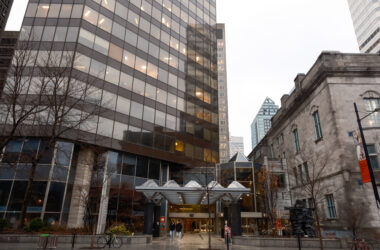The strict provisions of Quebec’s new French language law, Bill 96, have raised concerns among international students and faculty members at McGill about the impacts the legislation will have on their lives. With the law making it harder to access public services in English, some non-French-speaking community members are worried that Montreal will become a less desirable place to study and work.
To fulfill the Coalition Avenir Québec’s (CAQ) mandate and to strengthen the French language charter, the National Assembly of Quebec passed Bill 96 on May 24. Since its introduction, Bill 96 has drawn criticism for the severity of some of its provisions, as well as its invocation of the notwithstanding clause, which allows the bill to override certain clauses of the Canadian Charter of Rights and Freedoms.
While McGill is situated in Quebec—where the official language is French—it is an English-speaking institution where 49 per cent of students self-report being beginner or intermediate level French speakers. McGill also has a significant international population: 30 per cent are foreign students, though students from France comprise 16 per cent of this group.
In an email to The McGill Tribune, Ratna Ghosh, a professor in McGill’s Department of Integrated Studies in Education, explained that she believes Bill 96 will act as a barrier for international students wanting to come to McGill.
“What Bill 96 is doing is making things difficult for international students who come to Quebec and don’t know French,” Ghosh wrote. “A large share of international students come to McGill thinking they are coming to an English university but in Montreal […] they will not be able to access public services in English [….] This is not the way to attract international talent at a time of intense globalization.”
Ghosh added that Bill 101, a law conceived to make French the most commonly used language in Quebec, had already been successful in promoting French since it came into effect in 1977.
Bill 96 affects the operations of businesses, schools, and immigration services by requiring most communication to take place solely in French and by making it easier for the Quebec Board of the French Language to conduct searches and seizures of entities that fail to comply. The new law also requires that new immigrants learn French within six months of their arrival, after which all public services must, by default, be provided in French.
Onyeka Dike, a second-year English Literature master’s student at McGill and the External Affairs Officer of the Post-Graduate Students’ Society (PGSS), echoed Ghosh’s warning about Bill 96 in an email to the Tribune. Dike gave examples of certain struggles McGill community members may face due to Bill 96, such as an international student being forced to navigate Quebec rental tribunal proceedings in French, that may deter them from establishing roots in Montreal.
“When all these factors are considered, it goes without saying McGill and other schools in the province will become unattractive to anglophone and allophone students across the world,” Dike wrote.*
Despite the Bill’s potential impacts on students and faculty members, McGill media relations officer Frédérique Mazerolle said it will not affect the way McGill offers services to students. In an email to the Tribune, Mazerolle assured that McGill’s language of instruction will remain English.
“Like all businesses and institutions operating in Quebec, McGill University must comply with the laws and provisions in force, including with respect to the Charter of the French Language,” Mazerolle wrote. “The University is currently examining Bill 96 and changes to the Charter that affect universities, businesses, government agencies, workers and consumers. As we adapt to these changes, it is important to stress that we will continue to offer teaching and services in English to students.”
*The views expressed by Onyeka Dike are his own and do not represent those of PGSS.










